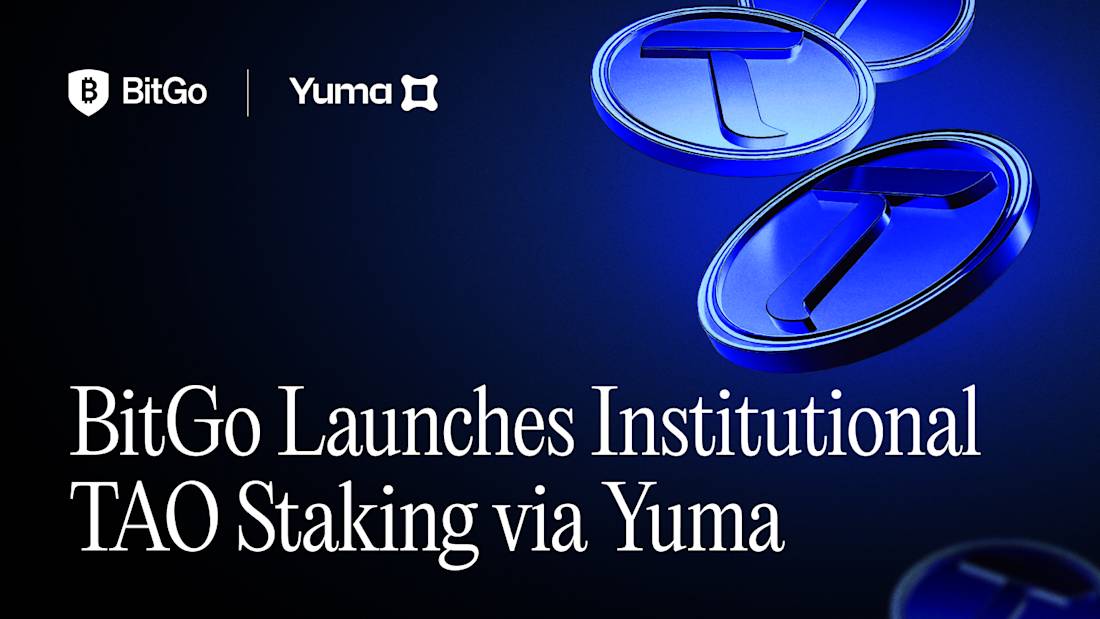BitGo is pleased to announce support for staking TAO, the native token of Bittensor, through a new partnership with Yuma, a trusted infrastructure provider and leading validator on the Bittensor network.
This marks the latest expansion of BitGo’s institutional staking offerings—now bringing secure, compliant access to one of the most promising protocols at the intersection of AI and decentralized infrastructure.
What is Bittensor?
Bittensor is a decentralized intelligence network where thousands of participants collaborate to build, train, and validate AI models across independently operated subnets. TAO fuels the protocol’s incentive design, enabling participants to earn rewards and secure the network through staking.
As decentralized AI gains momentum, institutional interest in Bittensor continues to rise. BitGo now makes it easier for institutions to stake TAO—securely and at scale.
Powered by Yuma Validator
Yuma is a DCG company and premier validator on Bittensor. With a focus on security, performance, and transparency, Yuma’s validator infrastructure is built to meet the high standards of institutional clients. Its siloed architecture, real-time monitoring, and 24/7 uptime deliver best-in-class reliability.
“We built Yuma’s validator for partners like BitGo—institutions who demand security, transparency, and long-term integrity,” said Evan Malanga, Chief Revenue Officer at Yuma. “This partnership makes it easier than ever for institutions to stake TAO with confidence and gain exposure to decentralized intelligence.”
BitGo shares this commitment to institutional security and reliability. As interest in decentralized AI accelerates, access to trusted infrastructure like Yuma’s is essential.
“As demand grows for exposure to decentralized AI, BitGo is focused on delivering institutional-grade access to emerging ecosystems like Bittensor,” said Gbenga Omosuyi, Head of Strategic Partnerships at BitGo. “Our partnership with Yuma unlocks secure TAO staking for clients who require trusted infrastructure and regulated custody.”
For institutional clients who want to learn more about staking TAO via BitGo, reach out to your Customer Success Manager or connect with us.
Table of Contents
The latest
All NewsAbout BitGo
BitGo is the digital asset infrastructure company, delivering custody, wallets, staking, trading, financing, and settlement services from regulated cold storage. Since our founding in 2013, we have been focused on accelerating the transition of the financial system to a digital asset economy. With a global presence and multiple regulated entities, BitGo serves thousands of institutions, including many of the industry's top brands, exchanges, and platforms, and millions of retail investors worldwide. For more information, visit www.bitgo.com.
©2026 BitGo, Inc. (collectively with its parent, affiliates, and subsidiaries, “BitGo”). All rights reserved. BitGo Bank & Trust, National Association (“BitGo Bank & Trust”) is a national trust bank chartered and regulated by the Office of the Comptroller of the Currency (OCC). BitGo Bank & Trust is a wholly-owned subsidiary of BitGo Holdings, Inc., a Delaware corporation headquartered in Palo Alto, California. Other BitGo entities include BitGo, Inc. and BitGo Prime LLC, each of which is a separately operated affiliate of BitGo Bank & Trust.
BitGo does not offer legal, tax, accounting, or investment advisory services. The information contained herein is for informational and marketing purposes only and should not be construed as legal, tax, or investment advice. You should consult with your own legal, tax, and investment advisor for questions about your specific circumstances.
Digital assets are subject to a high degree of risk, including the possible loss of the entire principal amount invested. Past performance and illustrative examples do not guarantee future results. The value of digital assets can fluctuate significantly and may become worthless. No BitGo communication is intended to imply that any digital asset services are low-risk or risk-free. BitGo is not a registered broker-dealer and is not a member of the Securities Investor Protection Corporation (“SIPC”) or the Financial Industry Regulatory Authority (“FINRA”). Digital assets held in custody are not guaranteed by BitGo and are not subject to the insurance protections of the Federal Deposit Insurance Corporation (“FDIC”) or SIPC. Custody and other digital asset services are subject to eligibility, jurisdictional, and regulatory restrictions. Availability of specific products and services may vary by location and entity.
BitGo endeavors to provide accurate information on its websites, press releases, blogs, and presentations, but cannot guarantee all content is correct, completed, or updated. Content is subject to change without notice. BitGo disclaims any obligation to update or supplement such information except as required by applicable law or regulation.
BitGo makes no representation that the information contained herein is appropriate for use in any jurisdiction where its distribution or use would be contrary to law or regulation or would subject BitGo or any of its affiliates to any registration or licensing requirements in such jurisdiction. Persons who access this information are responsible for complying with all applicable laws and regulations.




